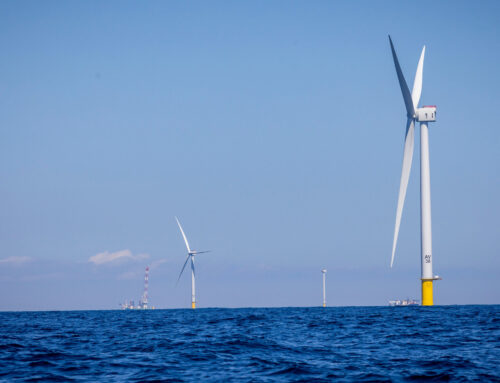How the Senate GOP’s New Tax on Renewables Could ‘Kill’ the Industry
June 29, 2025
Senate Republicans are in the final stages of passing their budget reconciliation megabill — which suddenly includes a new tax on solar and wind projects that has sent many in the industry into full-blown crisis mode.
The proposed tax was tucked inside the latest text of the Senate reconciliation bill, released late Friday night, and would levy a first-of-its-kind penalty on all solar and wind projects tied to the quantity of materials they source from companies with ties to China or other countries designated as adversaries by the U.S. government. Industry representatives are still processing the legislative language, but some fear it would kick in for certain developers as soon as the date of its enactment. Taken together with other factors both in the bill and not, including permitting timelines and Trump’s tariffs, this tax could indefinitely undermine renewables development in America.
On Saturday, as legislators began to digest the new text, Senator Brian Schatz declared on X not once, not twice, but three times that with the new penalty, this bill would on its own “kill” the U.S. solar energy industry, leading to energy shortages and raising costs across the board. “I promise you,” he wrote, “this bill is worse than you think.”
Senator Sheldon Whitehouse of Rhode Island, a staunch advocate for climate policy, said in a statement to Heatmap that the tax will help China and hurt American families, “all so Republican oil and gas donors can make even bigger profits. This isn’t policy; it’s pay-off.”
Without this new tax, energy companies might’ve quietly swallowed the bitter pill of losing the incentives established in the Inflation Reduction Act. In the weeks since the first version of this legislation was introduced in the House, I’ve interviewed numerous renewables developers, tax attorneys, and cleantech investors, who have emphasized the resilience of the industry given rising energy demand and explained that there would still be many ways for projects currently under development to qualify for the credits before they’d be phased out. The history of renewable energy tax credits in the U.S. is full of of phase-outs and restarts. The industry’s been at least somewhere like this before.
But the withdrawal of incentives is one thing. A targeted federal tax that could increase development costs by up to 20% that is levied over longstanding supply chain relationships that will take not years but rather decades to rebuild is another.
The American Council on Renewable Energy said in a statement that the latest iteration of the bill “effectively takes both wind and solar electric supply off the table, at a time when there is $300 billion of investments underway, and this generation is among the only source of electricity that will help to reduce costs and keep the lights on through the early 2030s.” The North America’s Building Trades Unions issued a statement after the text’s release calling it the “biggest job-killing bill in the history of this county” and adding that that “simply put, it is the equivalent of terminating more than 1,000 Keystone XL pipeline projects.”
“I think it’s impossible to overstate how this new version of the bill makes the House bill look moderate by comparison,” Andrew Reagan, president of Clean Energy 4 America, told me in an exasperated tone over the phone Saturday afternoon. “The hope as I see it is that as the full impact of how devastating this proposal would be for every state in the country comes into play, as this comes to the floor, Senate Republicans who claim to care about this issue come to [Majority Leader John] Thune and ask to amend this.”
The tax would apply to new solar and wind construction and be calculated based on the degree to which a project exceeds statutory limits for materials sourced from “foreign entities of concern,” i.e. Russia, North Korea, Iran, and most especially China. Solar projects would have to pay a 50% tax on the value of the overage, and wind projects would pay 30%.
Here’s a simplified example to illustrate how it would work: Say you are developing a solar project that will begin operating in 2028, and the total cost of all of your material inputs is $100,000. The new law would require that at least 50% of the value of all of your materials come from entities disconnected from Chinese companies and investment (the statutory limit for 2028), but your project is only able to achieve 40%. The extra $10,000 dollars you paid to companies with ties to China would be subject to the 50% solar tax, adding $5,000 to the total cost of your project. And this doesn’t even touch the new expense of capturing and reporting all of this supply chain data for the federal government.
The rules for how developers would actually calculate the value of their various material inputs will be subject to the Treasury’s interpretation and guidance, so it is impossible to determine how harshly this tax would fall on any individual solar or wind energy facility. Even so, Rhodium Group has estimated that it would increase project costs overall by 10% to 20% — a whopping total to eat on top of losing key tax credits.
This penalty for sourcing linked to China dates back to the IRA’s consumer electric vehicle tax credit. As I was first to report years ago for E&E News, Senator Joe Manchin successfully limited the credit’s scope by requiring qualifying cars to be made with an increasing percentage of materials from the U.S. or a country with a free trade agreement and mandating that materials could not come from a foreign entity of concern. This tactic mostly failed to reshore mineral supply chains as quickly Manchin had hoped it would, but it did ensure that relatively few vehicles qualified.
This anti-foreigner approach to energy policy has now been taken up by Republicans in Congress to erode the IRA overall. As my colleagues Emily Pontecorvo and Matthew Zeitlin have explained, the Senate legislation would deny tax credits to companies that have supply chains with any ties to China, which many say would effectively stop them from qualifying for the credits.
This specific policy approach is something I’ve previously dubbed the GOP’s “anti-China trap” for renewable energy. Now, on top of cutting off companies from tax credits, this trap will catch them for failing to reinvent their supply chains overnight with little if any warning. Of course, reshoring these supply chains will also be more difficult because of other provisions in the bill that would erode and eliminate advanced manufacturing tax incentives originally designed to encourage companies to make more of these components at home.
The only silver lining here is that the fight isn’t over. It wouldn’t surprise me to see a senator try to get rid of this tax as the bill moves through the amendment process on the Senate floor.
I expect some sort of intervention here because there appears to be momentum from powerful entities outside of Congress to get rid of this tax. Reviews of this piece of the bill are so bad, it has put the American Clean Power and the U.S. Chamber of Commerce on the same side as pro-fossil “philosopher” Alex Epstein, who is also calling on senators to oppose the tax.
“I just learned about the excise tax and it’s definitely not something I would support,” he posted to X yesterday, adding he’d rather they focus on removing the tax credits instead of creating a new cost. “I stand for energy freedom, always, in every situation,” he added in a separate post defending his opposition.
Elsewhere on X yesterday, Elon Musk spent hours (on his birthday, no less) going after the Senate bill, reposting energy wonks’ rants about the bill and its tax on renewables, including from Jesse Jenkins, the host of Heatmap’s very own Shift Key podcast.
So, okay, but will Musk, Epstein or any of these other critics convince at least one senator to force a successful vote on getting rid of the tax? That’s really the only way it can go away, because it’s very likely the Senate will force the House to pass whatever it passes.
I talked to Jenkins hours after Musk reposted him and filled up his replies. Like the iconoclastic billionaire, he told me he thinks this legislation is worse than anything congressional Republicans had released before it. A big reason for that is indeed the excise tax, a completely new idea that hadn’t been in any other previous draft of the bill or debated in committee, which he sees as a “obviously, deliberatively punitive attack on the wind and solar industry for what appears to be purely ideological reasons.”
“It’s going to kill hundreds of billions of dollars in investment and hundreds of gigawatts of new supply that would otherwise help us meet rapidly growing electricity demand. So, yeah, higher energy prices, less jobs, less investment in American energy production, and less confidence in the American business environment,” Jenkins said. “No one is asking for this.”
Debate on the bill is expected to begin later today, and the amendment process will stretch into Monday morning at least.
Additional reporting by Emily Pontecorvo
Editor’s note: This story has been updated to include a statement from Senator Sheldon Whitehouse.
Search
RECENT PRESS RELEASES
Related Post



